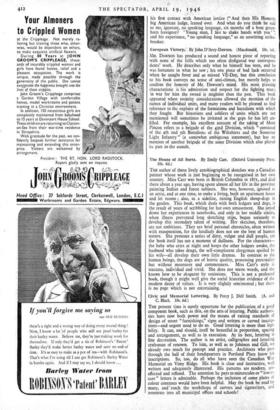The House of All Sorts. By Emily Carr. (Oxford University
Press. 10s. 6d.)
THE author of these lively autobiographical sketches was a Canadian painter whose work is just beginning to be recognised in her own country. Miss Carr was born in British Columbia in 1871, and died there about a year ago, having spent almost all her life in the province painting Indian and forest subjects. She was, however, ignored as an artist, and at one time, to make a living, built an apartment house and let rooms ; also, as a sideline, raising English sheep-dogs in the garden. This book, which deals with both lodgers and dogs, is the result of years of scribbling for her own amusement. She jotted down her experiences in notebooks, and only in her middle sixties, when illness prevented long sketching trips, began seriously to develop this secondary talent of writing. Her sketches, therefore, are not ambitious. They are brief personal chronicles, often written with exasperation, for the landlady does not see the best of human nature. She presents a series of dirty, vulgar and dull people, yet the book itself has not a moment of dullness. For the characters— the baby who cries at night and keeps the other lodgers awake, the husband who takes drugs, the self-complacent clergyman spoiled by his wife—all develop their own little dramas. In contrast to the human beings, the dogs are of heroic quality, possessing personality but without meanness and commonness. Miss Carr's style is staccato, individual and vivid. She does not waste words, and she knows how to be eloquent by omissions. This is not a profound book, though it might well give the social historian evidence of the modern decay of values. It is very slightly sentimental ; but there is no page which is not entertaining.






























 Previous page
Previous page